The Samsung 850 EVO 4TB SSD Review
by Billy Tallis on July 11, 2016 10:00 AM ESTRandom Read Performance
The random read test requests 4kB blocks and tests queue depths ranging from 1 to 32. The queue depth is doubled every three minutes, for a total test duration of 18 minutes. The test spans the entire drive, which is filled before the test starts. The primary score we report is an average of performances at queue depths 1, 2 and 4, as client usage typically consists mostly of low queue depth operations.
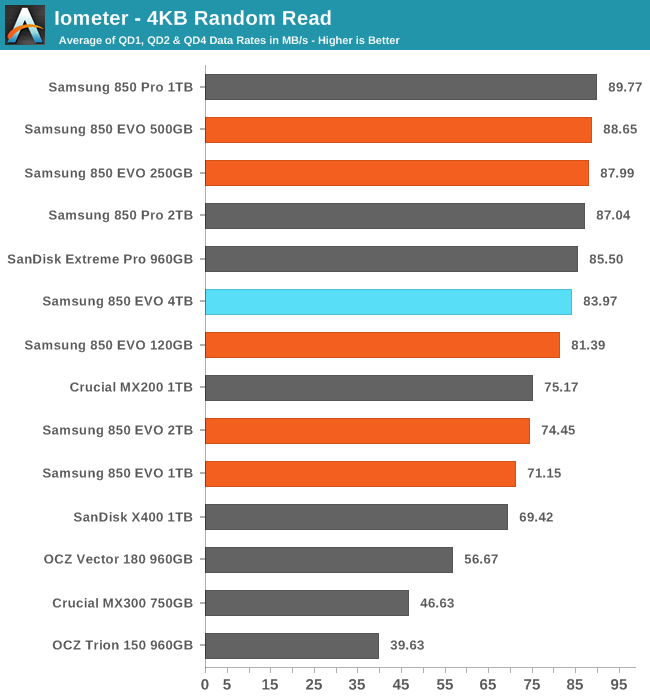
Random read performance of the 4TB 850 EVO is substantially better than the 1TB and 2TB 850 EVOs, but still not quite as fast as the best MLC drives or the 500GB and 250GB 850 EVOs.
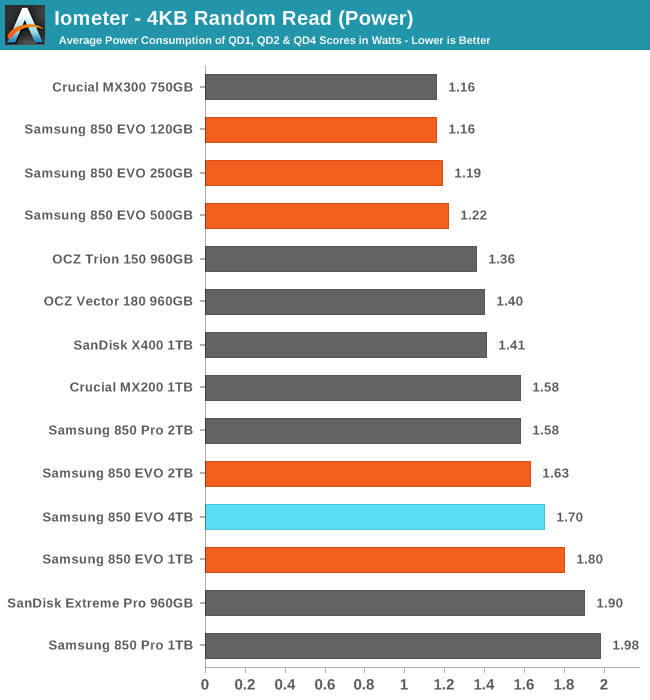
The power consumption of the 4TB 850 EVO is slightly higher than the 2TB model, but overall the efficiency is improved over the smaller drive with the same controller but older NAND.
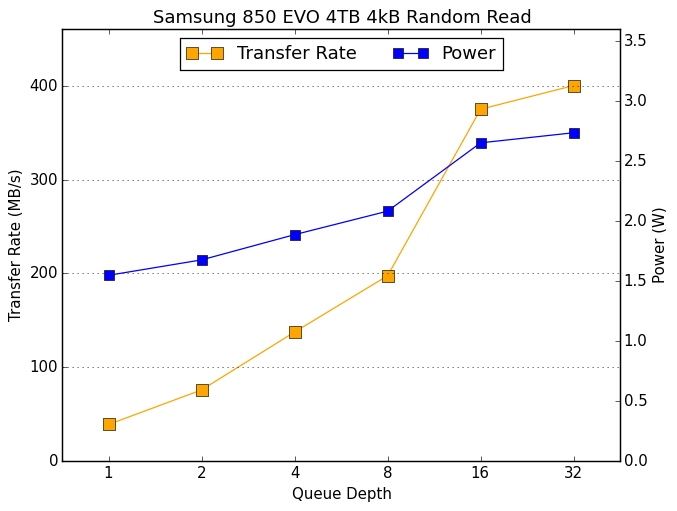 |
|||||||||
The scaling behavior of the 4TB 850 EVO is almost identical to the 2TB model, just with slightly higher performance and power consumption across the board.
Random Write Performance
The random write test writes 4kB blocks and tests queue depths ranging from 1 to 32. The queue depth is doubled every three minutes, for a total test duration of 18 minutes. The test is limited to a 16GB portion of the drive, and the drive is empty save for the 16GB test file. The primary score we report is an average of performances at queue depths 1, 2 and 4, as client usage typically consists mostly of low queue depth operations.
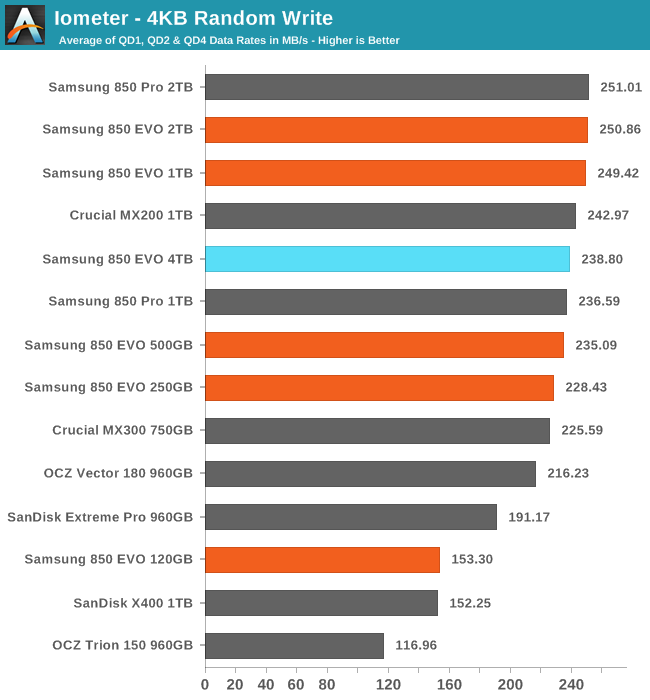
Random write speed for the 4TB 850 EVO is a little bit slower than for the 1TB and 2TB models, but still fast enough to beat almost all non-Samsung drives.
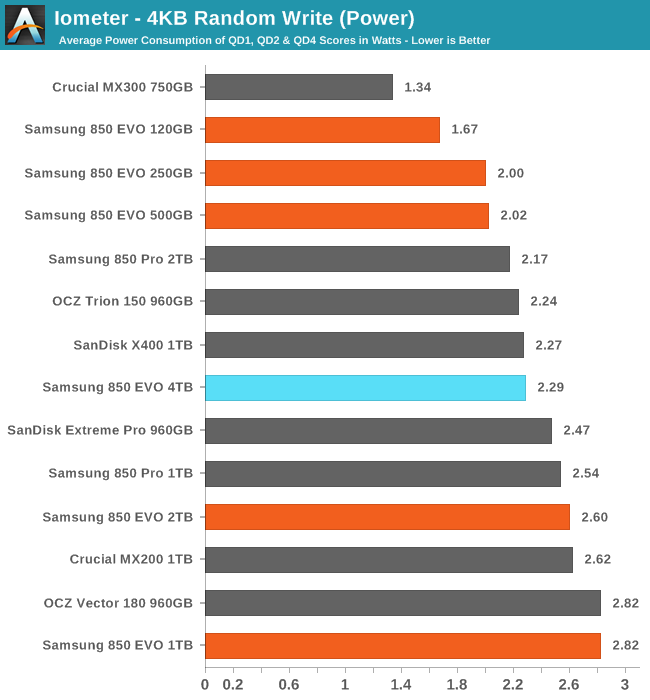
Power consumption of the 4TB 850 EVO is substantially better than the 1TB and 2TB counterparts, making it one of the most efficient large drives. The 750GB Crucial MX300 was still much more efficient.
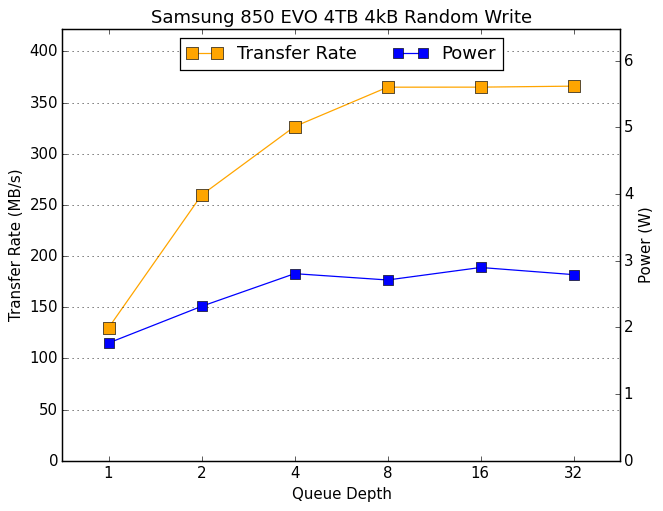 |
|||||||||
The lower performance score for the 4TB was apparently due to a regression in QD4 performance, where the 1TB and 2TB models were able to reach full speed but the 4TB needs a larger queue.










145 Comments
View All Comments
JellyRoll - Monday, July 11, 2016 - link
It is relative. 75 total drive writes of 4TB are huge.Daniel Egger - Monday, July 11, 2016 - link
Not at all. There're many scenarios where one would chose a larger drive without immediate need. In fact I'd never take a drive I can immediately fill up a 100%, what'd be the point in that? Also this is a consumer drive and how many customers do you know *writing* away TB after TB, many kinds of data are actually write-once-read-often...My laptop SSD has been powered on for pretty much exactly two years now and seen 10TB writes per year. My home VM server sees 9.2 TB writes per year. So pretty much harmless and those two cases are already very much non-consumer scenarios...
ddriver - Monday, July 11, 2016 - link
If you really do a lot of writing, say you work with RAW 4k video, then you really don't care that much about latency, all you care about is bandwidth and capacity. In this case, what you really need is a good RAID controller and a dozen of good old HDDs.vladx - Monday, July 11, 2016 - link
This drive is not suited for 4K video work, everyone knows that. Using an EVO for that kind of work iwould be very irresponsible and failure is 100% in the hands of the user .Oxford Guy - Monday, July 11, 2016 - link
I'll agree with you if there is a big red sticker on the box that says that.vladx - Tuesday, July 12, 2016 - link
@Oxford Guy: And this why we get people ranting about SSDs when it's their own fault for being ignorant.Kevin G - Monday, July 11, 2016 - link
Indeed and at this point you'd want a fast NVMe drive for high quality 4k captures.A 4 TB SATA SSD does have utility as a means to provide storage for an assort of cameras and equipment build around SATA drives. There are a lot of those out there mainly because U.2 hasn't taken hold (yet?).
ddriver - Monday, July 11, 2016 - link
Who captures video to PC LOL. Who logs a computer along with a camera.Impulses - Monday, July 11, 2016 - link
Some high end cine cameras actually capture straight to SSDImpulses - Monday, July 11, 2016 - link
Pretty sure he meant it as in 'working with 4K' anyway.